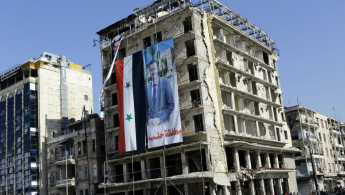Syria's Assad regime 'seizes dissidents' homes using anti-terror laws'
Under one such case, an architect who had joined street protests against President Bashar al-Assad early in the 2011 uprising and played a role in posting anti-government material online said he lost his house, office and farmland in Ghouta in southwestern Syria, as well as his car.
“I built my house brick by brick. I built it with my bare hands, tended to every corner and to every inch,” the architect said. He now lives in the northwestern province of Idlib after fleeing with many other Ghouta residents after its surrender in April.
A security order led to the architect’s membership to the Architects and Engineers Syndicate being terminated and cancelled his pension plan, he told Reuters. But he maintained his innocence, noting he only took part in protests but fell short of taking up arms against the government.
In 2016, the man, who did not want to be identified, said he attempted to sell his car to help provide for his family but was faced with shocking news.
“The broker in Damascus told me that a seizure for security had been imposed on all the properties owned by me, my partners, my wife and children,” he said via a messaging app.
But human rights groups said lists circulating online show that hundreds of such orders have been made, potentially affecting thousands of people.
Syria’s anti-terrorism laws were updated about a year into the 2011 uprising. The embattled Assad issued a decree to arm the courts with power to impose “security seizure” orders against individuals it deemed a threat.
A doctor from the eastern Ghouta town of Douma who left in April and now lives in Turkey said his house, land, clinic and car had also been seized by authorities.
“The Syrian regime has labeled all the opposition activists as terrorists, tried them in absentia and seized their properties,” he said.
Meanwhile, Human Rights Watch said Assad's orders to freeze assets were among numerous laws used by Syrian authorities to punish political dissidents and opponents.
However, Damascus has denied targeting peaceful dissidents with its anti-terrorism laws, or unlawfully dispossessing people.
The Syrian war began when the Baath regime, in power since 1963 and led by President Bashar al-Assad, responded with military force to peaceful protests demanding democratic reforms during the Arab Spring wave of uprisings, triggering an armed rebellion fuelled by mass defections from the Syrian army.
Hundreds of thousands of civilians have been killed in the war, mostly by the regime and its powerful allies deploying air strikes on civilians, and millions have been displaced both inside and outside of Syria.
Follow us on Twitter: @The_NewArab





 Follow the Middle East's top stories in English at The New Arab on Google News
Follow the Middle East's top stories in English at The New Arab on Google News
![Netanyahu furiously denounced the ICC [Getty]](/sites/default/files/styles/image_330x185/public/2024-11/GettyImages-2169352575.jpg?h=199d8c1f&itok=-vRiruf5)
![Both Hamas and the Palestinian Authority welcomed the ICC arrest warrants [Getty]](/sites/default/files/styles/image_330x185/public/2024-11/GettyImages-2178351173.jpg?h=199d8c1f&itok=TV858iVg)
